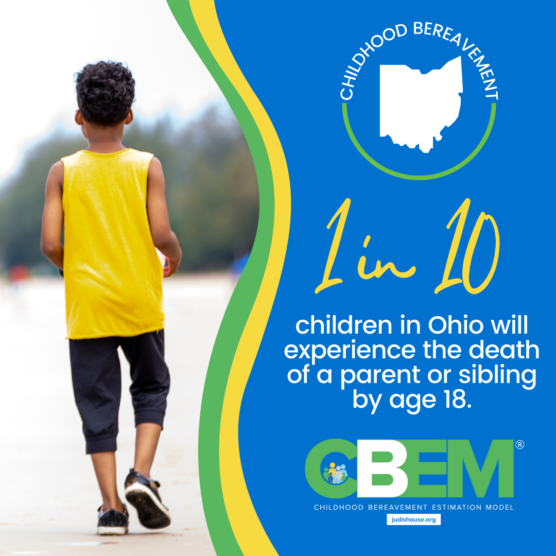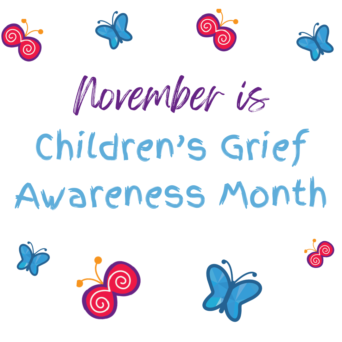
Children’s Grief Awareness Month, observed every November, is a dedicated time to recognize and raise awareness about the unique challenges that face young people who are grieving.
Childhood Grief is often overlooked, yet its impact is profound and long-lasting. This month serves as a vital reminder that young people who are grieving need compassionate support from those around them, both at home and in their communities.
JAG Institute’s 2024 Childhood Bereavement Estimation Model reports that 1 in 10 children in Ohio will experience the death of a parent or sibling by age 18.

This staggering statistic highlights the urgent need for grief-informed support systems. Without the right support, these young people are at risk of greater short and long-term difficulties, including academic performance, mental health issues, and early mortality.

Let's create a more understanding and supportive environment for these young people! By fostering open conversations, we can break down the stigma that often surrounds grief.
Join us and the National Movement for Children's Grief Awareness as we strive to create a more empathetic, grief-informed society by turning off our automatic responses and thinking about how our actions can show support.
This year, we're spotlighting the actions youth who are grieving prefer when it comes to supporting them. Follow along on our social media or visit the NACG website for more ways to Practice #FliptheScript.
- Be Present - Emphasize the importance of being physically present for young people who are grieving rather than trying to find the “perfect” words. Showcase actions that demonstrate care and attention, such as simply sitting with the child or engaging in a shared activity without the pressure of conversation.
- Listen Actively - Promote the value of listening to what young people who are grieving feel and want to express without interruption or immediate responses. Highlight the impact of being a comforting presence that prioritizes understanding over-responding.
- Actions Speak Louder Than Words - Focus on the importance of follow-through. When adults promise support or specific actions, it is crucial to ensure these promises are kept. This reinforces trust and provides tangible support that young people who are grieving can rely on.
- Press Pause On Advice - Discourage the use of clichés and prescriptive statements about how to grieve, how long to grieve, or what to feel. Encourage open-ended questions and responses that allow the young people to lead the conversation according to their needs.
- Get Moving - Address the physical manifestations of grief, not just the emotional. Encourage physical activities that might help young people express and cope with their grief, like walking, playing, or other gentle physical engagement.
- Cultivate A Support Environment - Stress the importance of creating a non-judgmental space for young people to express their grief. This involves not only verbal communication but also non-verbal cues that show understanding and compassion.
- Recognize The Uniqueness - Acknowledge that every young person is unique, as is their grief experience and their relationship to the person who died. Tailor interactions to their context, relationship, and personality. Avoid one-size-fits-all approaches and instead offer personalized support based on the child’s cues.
- Empower Their Voices - Allow young people to share their own stories and feelings.
Did you know that the third Thursday of every November is Children's Grief Awareness Day? Click here to learn how you can participate in observing with us on November 21st.

